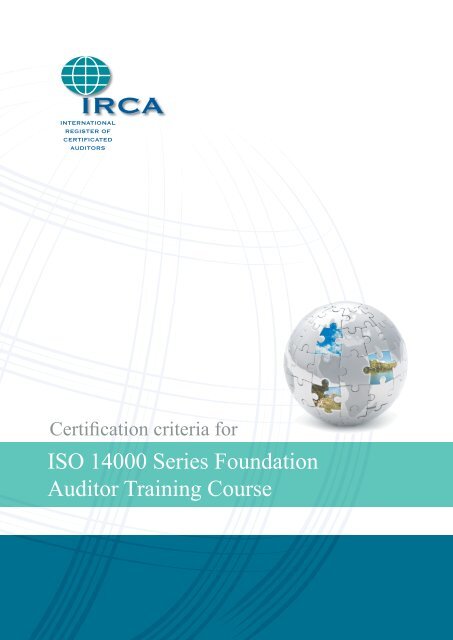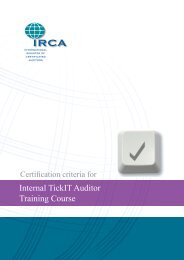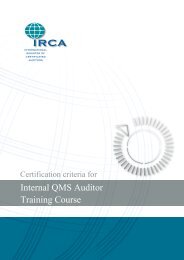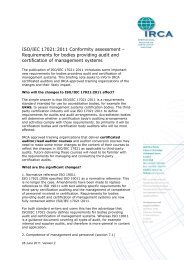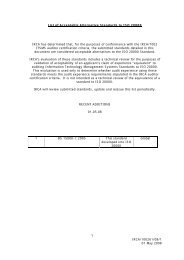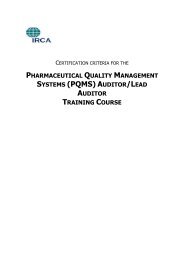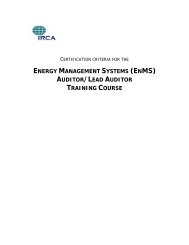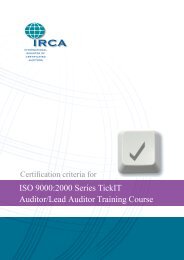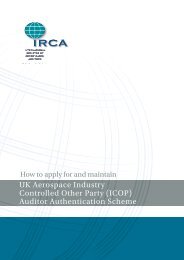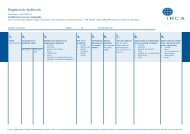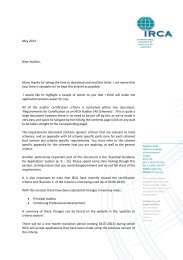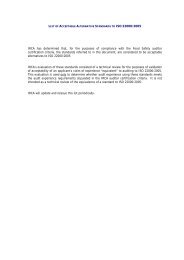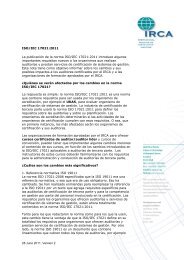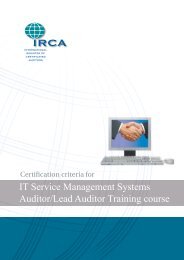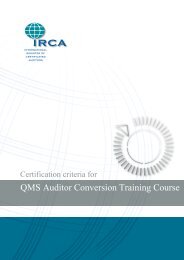ISO 14000 Series Foundation Auditor Training Course - IRCA
ISO 14000 Series Foundation Auditor Training Course - IRCA
ISO 14000 Series Foundation Auditor Training Course - IRCA
Create successful ePaper yourself
Turn your PDF publications into a flip-book with our unique Google optimized e-Paper software.
Certification criteria for<br />
<strong>ISO</strong> <strong>14000</strong> <strong>Series</strong> <strong>Foundation</strong><br />
<strong>Auditor</strong> <strong>Training</strong> <strong>Course</strong>
ight reserved. No part of this publication may be reproduced, stored in a retrieval<br />
All<br />
or transmitted in any form or by any means; electronic, mechanical,<br />
system<br />
recording or otherwise, without prior permission of the CQI<br />
photocopying,<br />
Register of Certificated <strong>Auditor</strong>s (<strong>IRCA</strong>).<br />
International<br />
CERTIFICATION CRITERIA FOR THE <strong>ISO</strong> <strong>14000</strong> SERIES FOUNDATION TRAINING COURSE<br />
Copyright <strong>IRCA</strong> - 2002
CERTIFICATION CRITERIA FOR THE <strong>ISO</strong> <strong>14000</strong> SERIES FOUNDATION TRAINING COURSE<br />
CONTENTS<br />
1. INTRODUCTION<br />
2. LEARNING OBJECTIVES<br />
3. ENABLING OBJECTIVES<br />
4. TRAINING METHODS<br />
5. COURSE CONTENT<br />
6. COURSE DURATION<br />
7. TUTORS AND STUDENTS<br />
8. VARIATIONS<br />
9. STUDENT ASSESSMENT<br />
10. ADVERTISING AND PROMOTIONAL MATERIAL<br />
Glossary<br />
Page 1 <strong>IRCA</strong>/2171/07/1 Jan 07
of the certification requirements common to all courses are detailed in <strong>IRCA</strong>/2000;<br />
Many<br />
Requirements for Organizations Providing Certified <strong>Auditor</strong> <strong>Training</strong>. These general course<br />
Approval<br />
completion of an <strong>IRCA</strong> certified <strong>ISO</strong><strong>14000</strong> <strong>Series</strong> <strong>Foundation</strong> <strong>Course</strong> will, in itself, NOT<br />
Successful<br />
the training requirements for <strong>IRCA</strong> certification to any grade of Environmental<br />
satisfy<br />
CERTIFICATION CRITERIA FOR THE <strong>ISO</strong> <strong>14000</strong> SERIES FOUNDATION TRAINING COURSE<br />
requirements are in addition to the requirements of <strong>IRCA</strong>/2171 and are mandatory.<br />
It is<br />
essential, therefore, that you are familiar with the requirements of <strong>IRCA</strong>/2000.<br />
Management Systems (EMS) auditor.<br />
Page 2 <strong>IRCA</strong>/2171/07/1 Jan 07
We, the International Register of Certificated <strong>Auditor</strong>s (<strong>IRCA</strong>), have developed<br />
1.1<br />
document to help you, the approved <strong>Training</strong> Organization, achieve<br />
this<br />
Before designing an <strong>ISO</strong><strong>14000</strong> <strong>Series</strong> <strong>Foundation</strong> training course to meet the<br />
1.2<br />
of this document you should consider the following:<br />
requirements<br />
<strong>ISO</strong> 14001 provides industry with a useful model for managing and<br />
1.2.1<br />
environmental impacts resulting from business operation.<br />
improving<br />
aim of the <strong>ISO</strong><strong>14000</strong> <strong>Series</strong> <strong>Foundation</strong> training course is to provide<br />
The<br />
with an overview of the purpose and requirements of <strong>ISO</strong><br />
students<br />
as a tool for the management of environmental aspects and<br />
14001<br />
impacts.<br />
This course may be valuable as preparation for students planning to<br />
1.2.2<br />
other <strong>ISO</strong> <strong>14000</strong> series-based training courses, such as the<br />
complete<br />
EMS <strong>Auditor</strong>/Lead <strong>Auditor</strong>, the <strong>IRCA</strong>/2007 EMS <strong>Auditor</strong><br />
<strong>IRCA</strong>/2017<br />
or the <strong>IRCA</strong>/2170 Internal EMS <strong>Auditor</strong> training courses, and<br />
Conversion<br />
as an introduction for anyone involved in the development,<br />
useful<br />
and management of a <strong>ISO</strong> 14001 environmental<br />
implementation<br />
This course does not address the skills required to audit an<br />
1.2.3<br />
management system. Where students require both<br />
environmental<br />
of <strong>ISO</strong> 14001 and audit skills this <strong>Foundation</strong> course can be<br />
knowledge<br />
with the <strong>IRCA</strong>/2170 Internal EMS <strong>Auditor</strong> training course, or<br />
run<br />
should consider taking the <strong>IRCA</strong>/2017 EMS <strong>Auditor</strong>/Lead<br />
students<br />
training course.<br />
<strong>Auditor</strong><br />
Students are not expected to have knowledge of auditing,<br />
1.2.4<br />
management systems or <strong>ISO</strong> 14001 before attending this<br />
environmental<br />
Your training course must be designed and delivered in accordance with<br />
1.2.5<br />
criteria in this document, although you may exercise flexibility in<br />
the<br />
inclusion of additional learning objectives, additional material, and<br />
the<br />
the structure and selection of specific training methods used during<br />
in<br />
We would be pleased to review your proposed approach and course outline<br />
1.3<br />
you begin detailed course development to help ensure that your final<br />
before<br />
product will meet the requirements in this document. The application<br />
training<br />
(see <strong>IRCA</strong>/151, Fees and Charges) must be paid before we will review any<br />
fee<br />
Objectives describe in outline what students will be able to do by the end of<br />
Learning<br />
course. By the end of the course students will be able to:<br />
your<br />
Describe the purpose of an environmental management system and explain the<br />
2.1<br />
framework relevant to an EMS.<br />
legislative<br />
CERTIFICATION CRITERIA FOR THE <strong>ISO</strong> <strong>14000</strong> SERIES FOUNDATION TRAINING COURSE<br />
1. INTRODUCTION<br />
certification of your <strong>ISO</strong><strong>14000</strong> <strong>Series</strong> <strong>Foundation</strong> training course.<br />
management system.<br />
course.<br />
your course.<br />
proposed course outlines.<br />
2. LEARNING OBJECTIVES<br />
2.2 Explain the purpose and intent of the <strong>ISO</strong> <strong>14000</strong> series of standards.<br />
2.3 Describe the <strong>ISO</strong>14001 requirements.<br />
Page 3 <strong>IRCA</strong>/2171/07/1 Jan 07
students to achieve the overall Learning Objectives they will need to develop<br />
For<br />
areas of knowledge. These are specified below as “Enabling Objectives” and can<br />
specific<br />
Describe the purpose of an environmental management system and<br />
3.1<br />
the legislative framework relevant to an EMS.<br />
explain<br />
Describe the purpose of an environmental management system in<br />
3.1.1<br />
environmental aspects and impacts.<br />
managing<br />
Outline the concepts of and approaches to environmental management<br />
3.1.2<br />
sustainable development as strategic business drivers.<br />
and<br />
Summarize briefly the relevant environmental legislation concerning<br />
3.1.3<br />
control via emissions to air, discharges to water and disposal to<br />
pollution<br />
including control over hazardous substances, and how relevant<br />
land,<br />
can be sourced.<br />
legislation<br />
Explain the purpose of the <strong>ISO</strong> <strong>14000</strong> series of standards, how they<br />
3.2.1<br />
and the benefits to organizations of using <strong>ISO</strong> 14001.<br />
interrelate<br />
Outline the content of <strong>ISO</strong> 14001 and the <strong>ISO</strong> <strong>14000</strong> series guidance<br />
3.2.2<br />
standards.<br />
Describe, with reference to the Plan, Do, Check, Act (PDCA) cycle, the<br />
3.2.3<br />
and scope of <strong>ISO</strong> 14001.<br />
structure<br />
Suggest possible ways in which organizations might satisfy the<br />
b)<br />
requirement.<br />
Determine conformance of a management system to <strong>ISO</strong> 14001<br />
3.3.3<br />
requirements.<br />
may deliver this course in a classroom or as a self-study course. Your course can be<br />
You<br />
as a single, complete learning event, or can be broken into discrete elements<br />
presented<br />
following requirements apply to all sections of the training course, regardless of<br />
The<br />
and method of delivery:<br />
media<br />
<strong>Training</strong> must be highly participative to allow all students to apply new<br />
4.1.1<br />
and enhance their learning, and so the training methods you<br />
knowledge<br />
CERTIFICATION CRITERIA FOR THE <strong>ISO</strong> <strong>14000</strong> SERIES FOUNDATION TRAINING COURSE<br />
3. ENABLING OBJECTIVES<br />
be thought of as steps to the achievement of the Learning Objectives.<br />
By the end of the course students will be able to:<br />
3.2 Explain the purpose and intent of the <strong>ISO</strong><strong>14000</strong> series of standards.<br />
3.3 Describe the <strong>ISO</strong> 14001 requirements.<br />
3.3.1 Explain key <strong>ISO</strong> <strong>14000</strong> <strong>Series</strong> definitions and terminology.<br />
3.3.2 For each numbered 1 clause of <strong>ISO</strong> 14001:<br />
a) Explain the intent of the requirement.<br />
4. TRAINING METHODS<br />
4.1 General<br />
that collectively cover all the Learning and Enabling Objectives.<br />
1<br />
Numbered clauses: coverage can be limited to the main requirements, e.g. 4.2.3 rather than the detailed sub requirements, e.g. 4.2.3<br />
a, b etc.<br />
Page 4 <strong>IRCA</strong>/2171/07/1 Jan 07
should involve and engage students throughout the duration of<br />
select<br />
course.<br />
your<br />
Each student must participate in practical, interactive activities for a<br />
4.1.2<br />
of 40% of your course duration.<br />
minimum<br />
You must build methods into your course for students to assess their<br />
4.1.3<br />
of the Learning and Enabling Objectives and for tutors to<br />
achievement<br />
Where your course is not delivered as a single, complete learning event,<br />
4.1.4<br />
must make appropriate arrangements to ensure continuity of<br />
you<br />
may be used for the full training course, or to supplement classroom<br />
Self-study<br />
training.<br />
Your self-study materials must be designed around a clearly structured<br />
4.2.1<br />
process with:<br />
learning<br />
Exercises and tests to provide comprehensive coverage of the<br />
c)<br />
learning and enabling objectives.<br />
relevant<br />
Feedback/self-assessment on exercises and tests where relevant,<br />
d)<br />
ensure students can self-assess their understanding and<br />
to<br />
of the Learning Objectives and identify areas any<br />
achievement<br />
further work.<br />
requiring<br />
providing students with a set of reading materials will not be<br />
Simply<br />
acceptable.<br />
Your self-study course materials must be clearly presented and<br />
4.2.2<br />
for ease of use, with appropriate navigational aids. You must<br />
structured<br />
the following clear to students to help them manage their<br />
make<br />
learning:<br />
The Learning Objectives for the overall self-study element of your<br />
a)<br />
course.<br />
The structure and suggested or intended sequence of the<br />
c)<br />
materials.<br />
Instructions for the students’ use of the materials, including<br />
d)<br />
timescales.<br />
realistic<br />
How, when and how often students may contact tutors for help,<br />
e)<br />
and feedback.<br />
guidance<br />
You must ensure that each student has timely access to a course tutor to<br />
4.2.3<br />
questions and queries.<br />
answer<br />
Your course must include methods for students to assess their learning<br />
4.2.4<br />
to seek timely feedback and coaching from the tutor(s).<br />
and<br />
CERTIFICATION CRITERIA FOR THE <strong>ISO</strong> <strong>14000</strong> SERIES FOUNDATION TRAINING COURSE<br />
provide timely feedback and coaching to students.<br />
learning, including use of summaries and learning reviews.<br />
4.2 Self-study<br />
a) Input (theory).<br />
b) Examples.<br />
b) The Learning Objectives for each section within your course.<br />
4.3 Classroom <strong>Training</strong><br />
Page 5 <strong>IRCA</strong>/2171/07/1 Jan 07
You must include session plans (i.e. documented outlines of the<br />
4.3.1<br />
process) for your tutors for each individual training<br />
training/learning<br />
Organizational arrangements, including tutor and student briefing<br />
d)<br />
and tutor:student ratios.<br />
details<br />
How your tutors must manage any elements of flexibility<br />
g)<br />
into the course. Any deviations from your course<br />
designed<br />
must be managed to ensure that all Learning Objectives<br />
timings<br />
adequately covered and that students are kept informed of<br />
are<br />
Knowledge-based sessions may be tutor led, but your course must allow<br />
4.3.2<br />
with students, so that tutors can test learning and students<br />
interaction<br />
At the beginning of your course you must provide the students with a description<br />
5.1<br />
the Learning Objectives, course structure & format, student responsibilities,<br />
of<br />
assessment processes and any assessment criteria. Your course must cover<br />
student<br />
aspects defined in clause 2, Learning Objectives, and clause 3, Enabling<br />
all<br />
Your course must include local requirements as appropriate for each country in<br />
5.2<br />
your course is presented.<br />
which<br />
Your course must include a description of the role of <strong>IRCA</strong>, the benefits of<br />
5.3<br />
as an <strong>IRCA</strong> EMS auditor, including brief details of the <strong>IRCA</strong> EMS<br />
certification<br />
certification scheme and how to contact <strong>IRCA</strong>. Web-based courses may<br />
auditor<br />
a link to the <strong>IRCA</strong> website www.irca.org.<br />
include<br />
Your course must be designed so that students can realistically complete<br />
6.1.1<br />
elements of your course within 20 hours.<br />
all<br />
The minimum course time is 7 hours over 1 day when there are 20<br />
6.2.1<br />
and one tutor (the method for calculating course duration is<br />
students<br />
in <strong>IRCA</strong>/2000). However, we recognise that it is possible to<br />
described<br />
the Learning and Enabling Objectives in a shorter time when there<br />
cover<br />
fewer students or a second tutor and you may build this flexibility<br />
are<br />
your course programme. (In determining the overall duration of the<br />
into<br />
based element appropriate you must give consideration to the<br />
class-room<br />
methods to be used, the need to demonstrate adequate coverage<br />
training<br />
CERTIFICATION CRITERIA FOR THE <strong>ISO</strong> <strong>14000</strong> SERIES FOUNDATION TRAINING COURSE<br />
session. These must specify:<br />
a) Learning and Enabling Objectives for the session.<br />
b) Duration of the session.<br />
c) The type of the activity and training method to be used.<br />
e) Deliverables required from students for practical sessions.<br />
f) Materials, exercises and equipment required to run the session.<br />
any changes.<br />
can clarify their understanding, as required.<br />
5. COURSE CONTENT<br />
Objectives.<br />
6. COURSE DURATION<br />
6.1 Where your course is delivered through self-study methods:<br />
6.1.2 Students must complete your course within 12 weeks.<br />
6.2 Where your course is delivered though classroom-based training:<br />
Page 6 <strong>IRCA</strong>/2171/07/1 Jan 07
all Learning and Enabling Objectives and time required to give<br />
of<br />
to each student. Session duration must be documented and may<br />
feedback<br />
variations to cater for different numbers of delegates.) Regardless<br />
include<br />
training methods and delegate numbers, it is unlikely that the<br />
of<br />
of these <strong>IRCA</strong> criteria can be achieved where the overall<br />
requirements<br />
is less than 6 hours.<br />
duration<br />
Your course may be delivered as a series of different elements at different<br />
6.2.2<br />
(e.g. as a part-time course), but all students must complete all<br />
times<br />
of your course within a 4-week period in order to successfully<br />
elements<br />
your course.<br />
complete<br />
Where classroom training is delivered through a virtual classroom rather<br />
6.2.3<br />
a real classroom, the duration must be increased as necessary to<br />
than<br />
the Learning Objectives and to ensure that the requirements for<br />
meet<br />
methods in clause 4 are met.<br />
training<br />
If you present your course through interpreters, the duration must be increased as<br />
6.3<br />
to achieve the Learning Objectives.<br />
necessary<br />
<strong>ISO</strong> <strong>14000</strong> <strong>Series</strong>; by understanding and having experience working<br />
7.1.2<br />
the series of standards.<br />
with<br />
You must provide sufficient tutor resource to ensure timely support for<br />
7.2.1<br />
undertaking self-study.<br />
students<br />
At the beginning of your course you must inform students how and<br />
7.2.2<br />
they may seek tutor support and how and when you will provide<br />
when<br />
You must run your course with at least one tutor, who must be present<br />
7.3.2<br />
the full duration of your course.<br />
for<br />
You must specify the tutor:student ratio for your course and you must<br />
7.3.3<br />
that the required number of tutors is available. You will be<br />
ensure<br />
to demonstrate how your course has been designed to<br />
required<br />
these criteria within your defined tutor:student ratio.<br />
accommodate<br />
We will consider requests for variations to any of these criteria, or in respect of<br />
8.1<br />
special circumstances. In this situation you should submit a written<br />
any<br />
CERTIFICATION CRITERIA FOR THE <strong>ISO</strong> <strong>14000</strong> SERIES FOUNDATION TRAINING COURSE<br />
7. TUTORS AND STUDENTS<br />
7.1 Tutors<br />
For this course tutors must demonstrate competence in the two key areas:<br />
7.1.1 <strong>Training</strong>; by satisfying the Tutor requirements specified in <strong>IRCA</strong>/2000.<br />
7.2 Self-Study<br />
a response.<br />
7.3 Classroom <strong>Training</strong><br />
7.3.1 Student numbers:<br />
The maximum number of students per course is 20.<br />
a)<br />
b) The minimum number of students per course is 4.<br />
8. VARIATIONS<br />
request to us immediately the requirement for the variation becomes apparent.<br />
Page 7 <strong>IRCA</strong>/2171/07/1 Jan 07
The impact on the learning and assessment processes and how this will<br />
8.2.3<br />
managed.<br />
be<br />
In order to satisfactorily complete your course each student must complete all<br />
9.1<br />
of your course, covering all Learning and Enabling Objectives.<br />
elements<br />
You must give each student feedback on his or her achievement of the<br />
9.1.1<br />
and Learning Objectives during your course and provide,<br />
Enabling<br />
For self-study courses or where student learning is conducted remotely<br />
9.1.2<br />
on the Internet), you must:<br />
(e.g.<br />
Verify, as far as is practically possible, that the student completing<br />
b)<br />
section of your course is the registered student.<br />
each<br />
Your training course advertising and promotional material must not state or<br />
10.1<br />
that satisfactory completion of this course fulfils the complete training<br />
imply<br />
environment where students can interact with each other and with the<br />
The<br />
in real time. This can either be a real classroom or training room, or a<br />
tutor,<br />
by which students can work alone through course materials.<br />
Arrangements<br />
materials can be in any appropriate media, including hard copy text,<br />
Self-study<br />
CERTIFICATION CRITERIA FOR THE <strong>ISO</strong> <strong>14000</strong> SERIES FOUNDATION TRAINING COURSE<br />
8.2 We will consider the following when evaluating any request for variation:<br />
8.2.1 Reasons for the requested variation.<br />
8.2.2 Proposed modifications to the training.<br />
9. STUDENT ASSESSMENT<br />
where practical, the opportunity to improve.<br />
a) Record each student’s completion of each section of your course.<br />
10. ADVERTISING AND PROMOTIONAL MATERIAL<br />
requirements for certification to any grade of EMS <strong>Auditor</strong>.<br />
GLOSSARY<br />
Classroom<br />
virtual classroom supported by appropriate software.<br />
Self-study<br />
e-learning or other electronic media, video, audio tape etc.<br />
Page 8 <strong>IRCA</strong>/2171/07/1 Jan 07


